Films with theme "La guerre d'Indochine", sorted by revenue
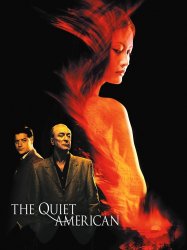
The Quiet American (2002)
, 1h41Directed by Phillip Noyce
Origin USA
Genres Drama, War, Thriller, Action, Romance
Themes French war films, La colonisation française, Films about writers, Films about journalists, Politique, La guerre d'Indochine, Political films, Histoire de France
Actors Michael Caine, Brendan Fraser, Đỗ Thị Hải Yến, Rade Šerbedžija, Tzi Ma, Holmes Osborne
Set in 1952 in Saigon, Vietnam, toward the end of the French war against the Democratic Republic of Vietnam (1945-1954), on one level The Quiet American is a love story about the triangle that develops between Thomas Fowler, a British journalist in his fifties; a young American idealist, supposedly an aid worker, named Alden Pyle; and Phuong, a Vietnamese woman. On another level it is also about the growing American involvement that led to the full-scale American war in Vietnam.
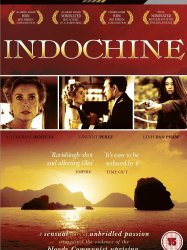
Indochine (1992)
, 2h32Directed by Régis Wargnier, Emmanuel Hamon, Philippe Charigot, Thierry Binisti, Jacques Cluzaud
Origin Vietnam
Genres Drama, Romance
Themes French war films, La colonisation française, Politique, La guerre d'Indochine, Political films, Histoire de France
Actors Catherine Deneuve, Vincent Pérez, Linh-Dan Pham, Jean Yanne, Dominique Blanc, Alain Fromager
In 1930 marked by growing anti-colonial unrest, Éliane Devries (Catherine Deneuve), a single woman born to French parents in colonial Indochina, runs her and her widowed father's (Henri Marteau) large rubber plantation with many indentured laborers, whom she casually refers to as her coolies, and divides her days between her homes at the plantation and outside Saigon. After her best friends from the Nguyễn Dynasty die in a plane crash, she adopts their five-year-old daughter Camille (Ba Hoang, as child). Guy Asselin (Jean Yanne), the head of the French security services in Indochina, courts Éliane, but she rejects him and raises Camille alone giving her the education of a privileged European through her teens.
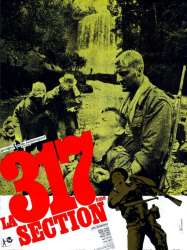
The 317th Platoon (1965)
, 1h40Directed by Pierre Schoendoerffer, Philippe Fourastié
Origin France
Genres Drama, War, Historical
Themes French war films, La colonisation française, Politique, La guerre d'Indochine, Political films, Histoire de France
Actors Jacques Perrin, Bruno Cremer, Pierre Fabre, Manuel Zarzo, Saksy Sbong
L'histoire de huit journées de guerre. En mai 1954, durant la guerre d'Indochine, la 317e section locale supplétive composée de quatre Français et de quarante-et-un Laotiens reçoit l'ordre d'abandonner le petit poste isolé de Luong Ba à la frontière du Laos, pour rallier une colonne partie au secours du camp retranché de Diên Biên Phu.

China Gate (1957)
, 1h37Directed by Samuel Fuller
Origin USA
Genres Drama, War, Thriller, Action
Themes French war films, La colonisation française, Politique, La guerre d'Indochine, Political films, Histoire de France
Actors Gene Barry, Angie Dickinson, Nat King Cole, Lee Van Cleef, George Givot, Marcel Dalio
Sergeant Brock (Gene Barry) and Goldie (Nat King Cole) are American Korean War veterans now serving as French Foreign Legion mercenaries in the First Indochina War. Angie Dickinson plays Brock's wife, a "half caste" Chinese Eurasian named "Lucky Legs" who resorts to smuggling to feed her five-year-old son she had with Brock. Brock abandoned her and the child when it was born with Asian features, feeling a "half breed" would not be welcome in America; an attitude towards miscegenation prevalent (in some quarters) at the time. Lucky is recruited by the French high command to use her knowledge to guide a demolition squad of Legionnaires led by Brock to blow up a hidden Viet Minh ammunition dump on the border with Red China. In return for her services, Lucky is promised by the French that they will arrange for her son's evacuation to America.

The Postman Goes to War (1966)
, 1h35Directed by Claude Bernard-Aubert
Origin France
Genres War
Themes French war films, La colonisation française, Politique, La guerre d'Indochine, Political films, Histoire de France
Actors Charles Aznavour, Jess Hahn, Michel Galabru, Pierre Mondy, Doudou Babet, Lucien Barjon
En 1954, un facteur parisien, lassé par son travail, part pour l'Indochine et se retrouve en pleine guerre.
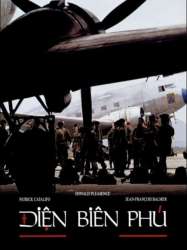
Dien Bien Phu (1992)
, 2h11Directed by Pierre Schoendoerffer
Origin France
Genres Drama, War
Themes French war films, La colonisation française, Politique, La guerre d'Indochine, Political films, Histoire de France
Actors Donald Pleasence, Jean-François Balmer, Patrick Catalifo, Maxime Leroux, Ludmila Mikaël, François Negret
The movie follows the chronological events of the battle. Some of them are shown in situ, from the heart of the battle, at Dien Bien Phu, while others are reported by civilians at Hanoi city or by paratroopers at Hanoi's civilian airport.
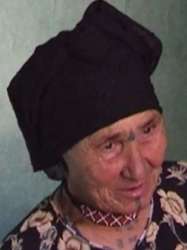
I Loved So Much... (2008)
, 50minutesDirected by Dalila Ennadre
Origin France
Genres Documentary
Themes French war films, La colonisation française, Politique, Films about sexuality, Erotic films, Films about prostitution, Documentary films about war, Documentary films about historical events, Documentary films about prostitution, La guerre d'Indochine, Political films, Erotic thriller films, Histoire de France
The documentary describes the life of a Moroccan woman employed as a prostitute in a military brothel by the French Colonial Army who took part in the Indochina War. Past 70, Fadma says she agreed to do the documentary so that France would recognize her as they do their veterans: "I too took part in the war".
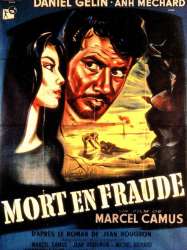
Mort en fraude (1957)
, 1h45Directed by Marcel Camus
Origin France
Genres Drama, War, Crime
Themes French war films, La colonisation française, Politique, La guerre d'Indochine, Political films, Histoire de France
Actors Daniel Gélin, Lucien Callamand
En Indochine, le destin tragique d'un petit employé attaché à une grosse entreprise commerciale.
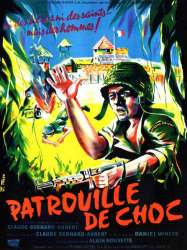
Shock Patrol (1957)
, 1h30Directed by Claude Bernard-Aubert
Origin France
Genres War
Themes French war films, La colonisation française, Politique, La guerre d'Indochine, Political films, Histoire de France
Actors Alain Bouvette, Jean-Claude Michel
Pendant la guerre d'Indochine, un groupe de soldats français occupe un poste isolé et subit l'assaut des maquisards du Vietminh.

Charlie Bravo (1980)
, 1h45Directed by Claude Bernard-Aubert
Origin France
Genres War
Themes French war films, La colonisation française, Politique, La guerre d'Indochine, Political films, Histoire de France
Actors Bruno Pradal, Jean-François Poron, Karine Verlier, Gérard Boucaron, Jean-Yves Gautier, Stéphane Gildas
À quelques jours de la fin de la guerre d'Indochine, un commando de treize parachutistes, avec à sa tête le lieutenant Brissac, est largué sur le village vietnamien de Quinh Quang où une infirmière — Catherine Fournier — est retenue prisonnière. Ils la délivrent et font retraite vers leur base — à vingt jours de marche de là — après avoir détruit le village et tué ses habitants. La nuit suivante, un des paras est abattu.
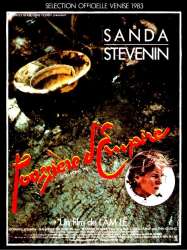
Dust of Empire (1983)
Directed by Lam Lê
Genres Drama
Themes French war films, La colonisation française, Politique, La guerre d'Indochine, Political films, Histoire de France
Actors Dominique Sanda, Jean-François Stévenin, Myriam Mézières, Anne Canovas, Lam Lê
L'action du film se déroule dans les dernières années de l'Indochine française. La première partie suit les parcours d'une nonne et d'un militaire. Dans la seconde partie, un combattant Việt Minh prisonnier confie à un évadé un message d'amour pour sa jeune femme enceinte. Le message est transmis à un enfant qui l'inscrit sur un papier, transmet le papier à une Française qui rentre en France avec les maîtres de la femme du prisonnier. 25 ans passent avant que ce message, passé de main en main puis oublié, soit redécouvert à Paris, où la femme du prisonnier habite désormais. Leur fille revient alors au Vietnam, décidée à refaire l'itinéraire de ce papier dispersé au fil de l'histoire tragique de son pays.

Outpost in Indo-china (1963)
, 1h25Directed by Léo Joannon
Origin France
Genres Drama, War
Themes French war films, La colonisation française, Politique, La guerre d'Indochine, Political films, Histoire de France
Actors Jacques Harden, Jean Rochefort, Alain Saury, Léo Joannon, Raymond Borderie, Foun-Sen
Le film Fort du fou narre, non sans nostalgie pour la période coloniale, l'abandon - durant la guerre d'Indochine - de réfugiés tonkinois catholiques par une armée française impuissante.

Saïgon, l'été de nos 20 ans (2011)
Directed by Philippe Venault
Origin France
Genres Drama
Themes French war films, La colonisation française, Politique, La guerre d'Indochine, Political films, Histoire de France
Actors Théo Frilet, Clovis Fouin, Adrien Saint-Joré, Audrey Giacomini, Barbara Probst, Samuel Labarthe
En 1949, trois amis d'enfance âgés de 20 ans, quittent leur village natal de Charente-Maritime pour l'Indochine. Alors qu'ils découvrent l'amour, ils se retrouvent pris dans la tourmente de la guerre d'Indochine.
 , 1h11
, 1h11Origin Bénin
Genres War, Documentary
Themes French war films, La colonisation française, Politique, La guerre d'Indochine, Political films, Histoire de France
Between 1946 and 1954, more than 60,000 African soldiers were sent to the Far East to fight against the Viet Minh. Many unions between Vietnamese women and African soldiers took place, and children were born, Some stayed with their mothers, but others were taken back to Africa. Through the story of Christophe, a 58-year-old Afro-Asian, Idrissou Mora-Kpai not only tells the story of these children of mixed heritage, but also the unnatural fight in which colonized Africans stood against the Vietnamese who were fighting for their independence.
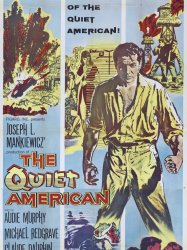
The Quiet American (1958)
, 2hDirected by Joseph L. Mankiewicz, Bernard Vorhaus
Origin USA
Genres Drama, War, Thriller, Romance
Themes French war films, La colonisation française, Films about writers, Films about journalists, Politique, La guerre d'Indochine, Political films, Histoire de France
Actors Audie Murphy, Michael Redgrave, Claude Dauphin, Giorgia Moll, Bruce Cabot, Yoko Tani
In Saigon in 1952, as Vietnamese insurgents are delivering major strikes against the French colonial rulers, an innocent and enigmatic young American economist (Audie Murphy), who is working for an international aid organization, gets caught between the Communists and the colonialists as he tries to win the "hearts and minds" of the Vietnamese people. By promising marriage, he steals away a young Vietnamese woman (Giorgia Moll) from an embittered and cynical English newspaperman (Michael Redgrave), who retaliates by spreading the word that the American is actually covertly selling arms to the anti-Communists.
 Connection
Connection